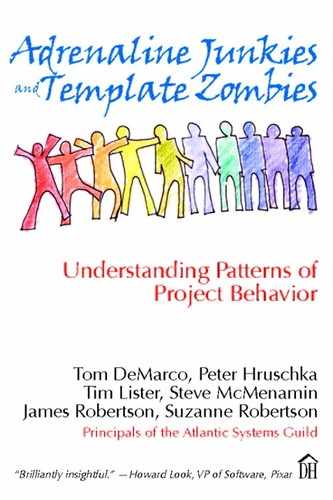7. Mañana
,
Photo by Mark Lisao ([email protected])
We all have windows of time within which we recognize that we need to start moving and keep moving to complete some work. Delivery dates beyond those windows create no sense of urgency, and therefore little motivation to act.
What if Paul Revere took his midnight ride through the villages and towns of Massachusetts shouting, “The British are coming! The British are coming! Sometime next year—I’m not exactly sure when or where, but next year, the British are coming!”[1]
[1] For those of you not familiar with American history and folklore, Paul Revere is said to have ridden on horseback through villages and towns one night, just before the American Revolution, warning the colonists that the British were coming and preparing them to fight the British at the Battle of Lexington in 1775. There is a poem, Paul Revere’s Ride, by Henry Wadsworth Longfellow, that every Massachusetts schoolchild memorizes. It ends with this:
“So through the night rode Paul Revere;
And so through the night went his cry of alarm
To every Middlesex village and farm,
A cry of defiance and not of fear,
A voice in the darkness, a knock at the door
And a word that shall echo forevermore!
For, borne on the night-wind of the Past,
Through all our history, to the last,
In the hour of darkness and peril and need,
The people will waken and listen to hear
The hurrying hoof-beats of that steed,
And the midnight message of Paul Revere.”
No mañana for Paul; he had a natural sense of urgency.
You’ve got to expect that he just wouldn’t have gotten the response he was hoping for. He probably would have been met with angry shouts of “Put a cork in it, Paul!” He may have even met with the occasional projectile chamber pot.
A sense of urgency is a magnificent catalyst for action. Remove that urgency, and that action slides down the list of Things To Do Today. Other matters become more compelling, and today is consumed by all the other stuff that consumes days.
We all have windows of time within which we recognize that we need to take immediate action in order to complete some work. For most of us, the window is about 30 to 90 days out. We can look at ourselves today, and see the path of work ahead for the next 30 to 90 days. We can plan our work for those days, and we can feel the urgency. We get a move on; we get an eagle-eyed focus on what needs to be done.
Outside that window is mañana. Mañana is our state of recognizing personal responsibility to complete some work—without recognizing that we must commence work now in order to be successful.
Most projects are longer than the human window of urgency. People cannot feel the urgency in their soul when the organization tells them that it is incredibly important to complete a project within the next 30 months. They hear it; they understand why it is important; but a little voice inside their head says,“Thirty months, by then you could be dead.”
Big projects stay out of mañana by keeping most people focused inside the window. They do this by directing the work toward tangible deliverables inside 90 days, often inside 30 days. You hear proposed deliverables like these:
“Let’s build a prototype of the trading screens—just for the bond traders, within the next two weeks.”
“Let’s build the code so the system can take in new orders, check if the items are in stock, and send a message to fulfillment. Don’t worry about changed or cancelled orders or anything else, just new orders. We should be able to demonstrate this by mid-month, all right?”
The wonderful thing about project people is that they can take on these near-term tasks as though they are up against the actual finish line. On basically healthy projects, people will work hard and stay focused on the prototype due in two weeks, just as if they are delivering the final system in two weeks.
Be careful, though: The key is a real deliverable at the end of the window. Progress alone is insufficient. Something like “Let’s get the spec to fifty percent complete by the end of May” just does not supply satisfying closure. The little voice says, “Fifty percent—that means not done by the end of May. What other work do I really have to complete by then?”
Watch out for a particularly virulent form of mañana: inordinate amounts of time spent getting ready to get started. Everyone spends time hunting for the perfect tools to support testing; everyone debates exactly how the libraries will be set up to provide the best possible support for the developers. This time has much more value if it is saved for finishing the work at the end of the project.
Sheila Brady, recalling her days as a project manager at Apple, had this observation about mañana versus what is in the line of sight:
“There has never been a project that, as it came down to the finish, wouldn’t die for an extra week on the schedule.”
Like all good project managers should, Sheila realized that the early days of the project are not treated as preciously as those at the end—and that the best way to get going is to get going, not mañana, but today.
